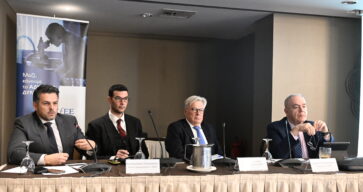
SFEE at the 8th Delphi Economic Forum
European Pharmaceutical Strategy and challenges for the Greek Health System: We need a stable and strong ecosystem that will boost and facilitate the access of patients to innovation while increasing the production of medicines in Europe
SFEE Press Release
Athens, May 2, 2023. – The Hellenic Association of Pharmaceutical Companies (SFEE) participated for the 8th consecutive year in the Delphi Economic Forum on Thursday the 27th of April, organising the discussion on the subject: “The European Pharmaceutical Strategy and the challenges for the Greek Health System”. The participants were the Ambassador of Denmark to Greece Mr. Klavs Holm, the President of SFEE and Director General of Novo Nordisk Hellas Mr. Olympios Papadimitriou, the Vice-president of SFEE and Director General of Boehringer Ingelheim Hellas Mr. Dimitris Anagnostakis and the President and CEO of Novartis Hellas Mr. Kostas Papagiannis.
The discussion was held one day after the publication of the European Commission proposal on the review of the European Pharmaceutical legislation. The President of SFEE, Mr. Olympios Papadimitriou, referred to the basic priorities and pillars pursued by the EC proposal and the necessity to have the European Pharmaceutical framework modernised, after more than two decades, while mentioning that both SFEE and EFPIA welcome the goals set by the European Pharmaceutical Strategy for a swifter and more equitable access to medication, a curtailing of shortages and securing that Europe may become the world leader in medical innovation. He stressed, nevertheless, that the EC proposal actually undermines Reasearch & Development in Europe, while failing to face radically the problems concerning patients’ access to medication.
Mr. Papadimitriou pointed out that the prerequisite of additional protection only if the medicine is available in all member states within 2 years from its market launching actually penalises innovation, ignoring that the vast majority of delays in new medication access is manifestly due to the regulatory framework of each country and the drug policy it implements.
The Vice-president of SFEE and Director General of Boehringer Ingelheim Hellas Mr. Dimitris Anagnostakis pointed out that innovation is an issue of survival for the European pharmaceutical industry, since there can be no sustainability without innovation. Our country is an EU member and investments in the EU also affect Greece, where pharmaceutical industry constitutes one of its most important growth pillars. He noted, in tandem, that Europe lies in the shadow of the USA, while in the last 25 years a full reversal has taken place and already only 22% of the investments are effected in Europe, vis-à-vis half of them effected in the USA. It is high time for Europe to decide whether it will be innovative or remain stagnant. We owe to take into consideration, both at European and national level, the high added value brought about by medicines in innovation, in high-skilled jobs, and state-of-the-art innovation in the production units and therefore elaborate those policies that will allow us to exploit the production potential.
Mr. Kostas Papagiannis, President and CEO of Novartis Hellas, underscored that the new legislative proposal comprises a lot of positive elements; nevertheless, the proposal for the reduction of the intellectual property rights protection comes in contrast with the goals set by the EU pharmaceutical strategy, since it does not facilitate access and does not sustain the long-term competitiveness of the life sciences sector. Intellectual property, stressed he, constitutes the foundation upon which medical innovation is built. He noted, in particular, that a competitive innovative industry is beneficial to all Europeans, creating jobs and prosperity and securing the strategic autonomy of Europe. He referred to the challenges the health systems have to deal with, especially with regard to equitable and universal access to medicines. He underscored that in order for Europe to remain the bastion of industry in the health sector, it is important to take into consideration its long-term competitiveness and this should be an integral part of the legislative proposal.
The joint commitment of the SFEE and EFPIA member companies is the continuation of the cooperation with the members of the European Parliament, the National Authorities and all stake-holders, so as to secure that the new pharmaceutical legislation will address the needs of the patients and the national health systems, and the unimpeded access to innovation.



